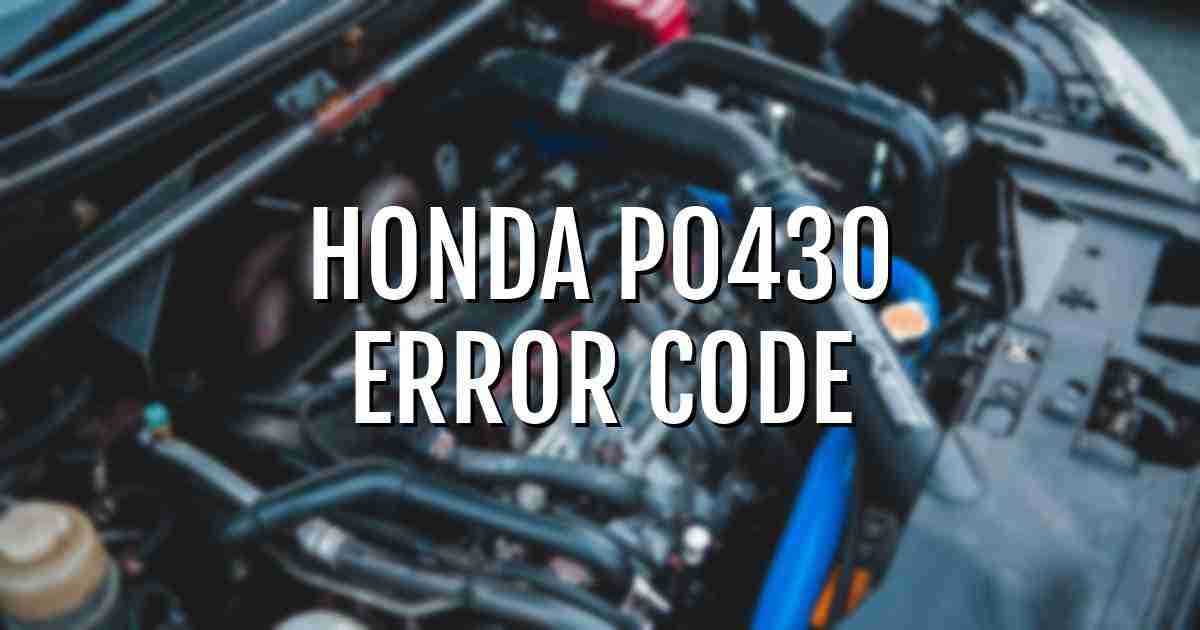The OBD code P0430 for Honda indicates a malfunction in the Threeway Catalyst Converter Bank 2 system.
Symptoms include the Engine Light being ON.
Common causes are a faulty catalyst converter, oxygen sensor, or fuel injector.
This issue is serious as it affects emissions and engine performance.
To fix, inspect and repair any damaged components, wiring harness, or connectors related to the catalyst converter system.
| Repair Importance Level | 6.67 (Out of 10) |
| Estimated Repair Time | Approximately 1.0 hour |
| Repair Difficulty Level | 6.67 (Out of 10) |
Symptoms of the Honda p0430 OBD Code
The vehicle may exhibit decreased fuel efficiency and a check engine light with code P0430.
- Symptoms: Check Engine Light ON.
- Decreased fuel efficiency.
- Loss of power during acceleration.
- Increased exhaust emissions.
Causes of the Honda p0430 OBD Code
Do you know you can clear most fault codes—but some could mean serious danger? Don’t take chances with your safety or your family’s safety. This budget-friendly car scanner makes it easy to clear fault codes in seconds while showing you exactly what’s wrong. Plug it in, connect to your Android or iOS phone, and instantly check live data. You’ll know if it’s a minor issue you can clear or something serious that needs attention—so you can drive safely and stress-free. (Today’s Deal)
P0430 in a Honda indicates a potential issue with the catalytic converter efficiency in bank 2.
- P0430 can be caused by a Faulty Threeway Catalyst Converter Bank 2.
- An Exhaust Tube with leaks.
- Intake Air Leaks in the system.
- A Faulty Oxygen (O2) Sensor.
- Faulty Fuel injector(s) not operating correctly.
- Leaking Fuel Injector(s) causing fuel mixture issues.
- Faulty Spark plugs not igniting fuel properly.
- Improper Ignition Timing leading to incomplete combustion.
- A Faulty Engine Control Module (ECM) not managing the system correctly.
- A Dirty Air Filter restricting airflow.
Fixing Honda Error Code p0430 Step By Step
Addressing Honda P0430 involves diagnosing and repairing the catalyst system efficiency below threshold in bank 2.
- To fix Honda OBDII code P0430, start by reviewing the ‘Possible Causes’ mentioned above and visually examining the corresponding wiring harness and connectors.
- Ensure to check for any damaged components and inspect the connector pins for signs of being broken, bent, pushed out, or corroded.
- Check the condition of the catalytic converter to see if it needs replacement.
- Perform a back pressure test to verify exhaust system efficiency.
- If the catalytic converter is faulty, replace it with a new one.
- Clear the fault code using a scan tool and test drive the vehicle to ensure the code does not return.
Cost Of Fixing Honda p0430 Fault Code
Diagnosing and repairing Honda P0430 typically involves inspecting and possibly replacing the catalytic converter.
The cost to diagnose and fix a Honda OBD code P0430 typically ranges from $75 to $150 per hour for labor rates.
With an estimated repair time of 1. 0 hour, the total cost can be around $75 to $150, depending on shop rates and the complexity of the issue.
That fault code is a turning point. If repair costs are climbing and your current loan feels like it’s holding you back, this is the time to plan ahead. The free Car Loan Payment Tracker helps you see how quickly you can pay off what’s left—and start preparing, with confidence, for your dream car.
Details of the Honda p0430 OBD Code
The fault code P0430 on a Honda indicates a catalyst system efficiency below threshold in bank 2.
Code P0430 on a Honda indicates that the catalytic converter efficiency for bank 2 is below threshold.
This means that the catalytic converter is not effectively reducing emissions as it should.
The ECM triggers this code by monitoring the signals from the oxygen sensors before and after the catalytic converter.
If the postcatalyst oxygen sensor detects that the converter is not doing its job properly, it will trigger a P0430 code.
This code is specific to the efficiency of the catalytic converter on bank 2 of the engine.
Mechanic’s Tech Notes
Detailed information on diagnosing and repairing Honda P0430 code related to catalyst system efficiency below threshold.
To diagnose and fix OBDII code P0430 on a Honda, start by checking the oxygen sensor (bank 2 sensor 1) and the catalytic converter’s efficiency.
Use a scan tool to monitor live data and compare the readings of the upstream and downstream oxygen sensors.
If the downstream sensor mimics the upstream sensor, it indicates a failing catalytic converter.
Additionally, inspect the exhaust system for leaks or damage that could affect catalytic converter performance.
If no issues are found, consider replacing the catalytic converter.
Remember to clear the code after repairs and perform a road test to ensure the issue is resolved.
FAQ
Common causes of OBD code P0430 in a Honda: Faulty Threeway Catalyst Converter Bank 2, Exhaust Tube, Intake Air Leaks, Faulty O2 Sensor, Faulty Fuel Injector(s).
Diagnose P0430 in Honda: Check Bank 2 catalyst converter, exhaust, intake leaks, O2 sensor, fuel injectors, spark plugs, timing, ECM. Inspect wiring, connectors for damage.
It is not safe to continue driving with OBD code P0430 in your Honda. Review possible causes and inspect components for damage.

Wrap Up
If your Honda triggers OBD code P0430 and you notice decreased fuel efficiency, rough idling, or a sulfur smell, it may indicate a failing catalytic converter, oxygen sensor, or exhaust leak.
Common causes include sensor malfunction, wiring issues, or a deteriorating converter.
To address Honda OBD code P0430, start by inspecting the oxygen sensor, checking for wiring damage, and ensuring proper sensor operation.
Test the catalytic converter efficiency and repair any exhaust leaks to resolve the issue effectively.

